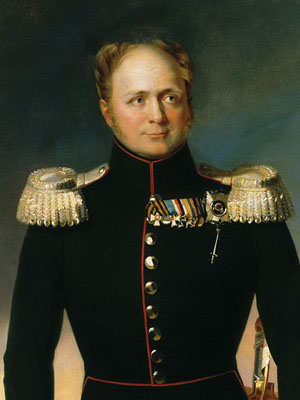
Masonic Biographies
Alexander I
Born: Tuesday, 23 December 1777
Died: Thursday, 01 December 1825
Alexander I, Czar of Russia, was a visionary leader and Freemason who combating injustice and initiated a vast plan of public education for his citizens.
Alexander I, Czar of Russia, endured a conflicted existence in which the realities of his life as a ruler often opposed his philosophically held beliefs. Born Aleksandr Pavlovich, he was the grandson of the reigning monarch of his country: Empress Catherine II. Catherine the Great took him from his parents and raised him herself to prepare him for the throne. A friend and disciple of the philosophers of the French Enlightenment, Catherine chose Frederic-Cesar La Harpe as a private tutor for Alexander. Revered and beloved by his young pupil, Frederic instructed Alexander in the virtues of the enlightenment, establishing in the future Czar an inquisitive, adept, and open mind.
Desiring to transform his nation, Alexander proposed the creation of a Constitution for Russia, as well as plans to limit the powers of the autocracy and liberate the masses from serfdom. His visions were quashed by vehement opposition from the ruling class and his fears of succumbing to his father's disastrous end. Instead, he turned his ambitions outward towards foreign policy and diplomacy, following in the footsteps of his Grandmother Catherine the Great, as known as the "Arbiter of Europe." It was this call to peace and unity which led him to the door of Freemasonry.
With characteristic confliction of principles, Alexander I first banned all secret societies in 1801 before lifting the ban and becoming a Freemason himself in 1803. That year, his counselor of State, Johann Boeber, re-educated Alexander as to the object and doctrine of Freemasonry and removed his prejudices against the Order; thus, Alexander rescinded his decrees against secret societies and subsequently knocked on the door of the temple. Alexander stated:
"What you have told me of the Institution not only induces me to grant it my protection and patronage, but even to ask for initiation into its mysteries. Is this possible to be obtained?"
To this question, Boeber replied:
"Sire, I cannot myself reply to the question. But I will call together the Masons of your capital and make your Majesty`s desire known; and I have no doubt that they will be eager to comply with your wishes."
Thereafter, the Grand Orient of Russia was established, and Brother Boeber was rewarded for his bravery and fortitude with the position of Grand Master of Russia. In 1814, Brother Alexander served as Master at military lodge in Paris and conferred degrees upon William III, Emperor of Germany. In November of 1815, the Masons of the Grand Orient of Poland hosted an impressive banquet in Brother Alexander's honor and in recognition of his membership in the Order.
Despite his dedicated participation in Masonry, Brother Alexander was informed of the possible political danger suspected in some Russian lodges. On the advice of Grand Master Kushelev, Alexander I reversed course, banning Freemasonry in Russia again on August 1, 1822. It is reported that he died mysteriously just a few years later in 1825.
